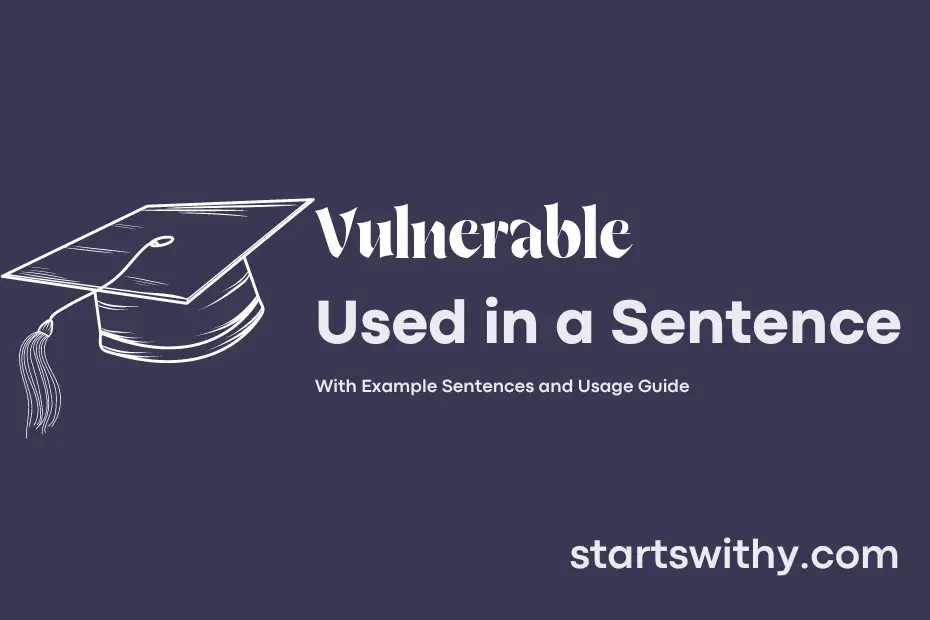Have you ever heard the term “vulnerable” and wondered what it means? In essence, vulnerable refers to being open to emotional or physical harm, susceptible to being hurt or wounded.
When someone is in a vulnerable state, they may be more easily influenced, taken advantage of, or affected by negative outside forces. Being vulnerable can stem from a variety of factors, such as a lack of protection, feelings of insecurity, or exposure to risky situations.
7 Examples Of Vulnerable Used In a Sentence For Kids
- Vulnerable animals need our help and protection.
- It is important to be kind to vulnerable friends who need support.
- Sometimes, plants can be vulnerable to too much sun or rain.
- We should always be gentle with vulnerable creatures like butterflies.
- It is our job to care for the vulnerable members of our community.
- When someone is feeling vulnerable, we should be understanding and kind.
- We should always look out for vulnerable classmates and help them when needed.
14 Sentences with Vulnerable Examples
- During exams, students may feel *vulnerable due to the pressure of performing well.*
- Leaving personal belongings unattended in the library can make them *vulnerable to theft.*
- Being new to a college can make students feel socially *vulnerable in unfamiliar surroundings.*
- Using public Wi-Fi networks without proper security measures can leave your personal information *vulnerable to hackers.*
- Over-relying on caffeine for energy can leave students *vulnerable to burnout and exhaustion.*
- Ignoring mental health issues can make students more *vulnerable to anxiety and depression.*
- Walking alone on campus late at night can make students feel *vulnerable to potential dangers.*
- Sharing personal identification details online can leave students *vulnerable to identity theft.*
- Skipping meals to save time or money can make students *vulnerable to health issues.*
- Not practicing safe sex can make students *vulnerable to sexually transmitted infections.*
- Not backing up important assignments can leave students *vulnerable to losing their work if their devices crash.*
- Accepting drink invitations from strangers can make students *vulnerable to being drugged.*
- Falling behind on coursework can leave students feeling *vulnerable to academic failure.*
- Ignoring cybersecurity best practices can make students *vulnerable to data breaches and hacks.*
How To Use Vulnerable in Sentences?
To use the word “Vulnerable” in a sentence, you will need to understand its meaning and how it can be applied in different contexts. Vulnerable is an adjective that describes someone or something that is easily hurt, harmed, or attacked.
Here are some examples of how you can use “Vulnerable” in a sentence:
- “The orphaned children were vulnerable to exploitation without a guardian to protect them.”
- “During a pandemic, the elderly and immunocompromised individuals are considered vulnerable populations.”
- “Leaving your personal information unsecured online can make you vulnerable to identity theft.”
- “After the earthquake, the damaged buildings were vulnerable to collapse in the aftershocks.”
When constructing a sentence with the word “Vulnerable,” it is important to consider the context in which you are using it. Think about who or what is being described as vulnerable and how they are at risk of harm or damage.
By incorporating Vulnerable into your vocabulary and practice, you will become more proficient in expressing ideas and communicating effectively in various situations. Remember to use the word accurately to convey the intended meaning and impact in your sentences.
Conclusion
In sum, the sentences with “vulnerable” painted a vivid picture of individuals or groups facing risks, harm, or challenges that require support and protection to thrive. These sentences highlighted the importance of acknowledging and addressing vulnerability in different contexts, whether it be vulnerable ecosystems, marginalized communities, or personal struggles. It is essential to recognize and empathize with those who are vulnerable, and work towards creating inclusive and supportive environments that promote resilience and empowerment.
By exploring various examples of sentences with “vulnerable,” we gain insights into the complex dynamics of vulnerability and the need for compassionate and proactive responses. These sentences underscore the significance of fostering empathy, understanding, and solidarity to uplift and safeguard those who are vulnerable, ultimately contributing to a more equitable and compassionate society.



